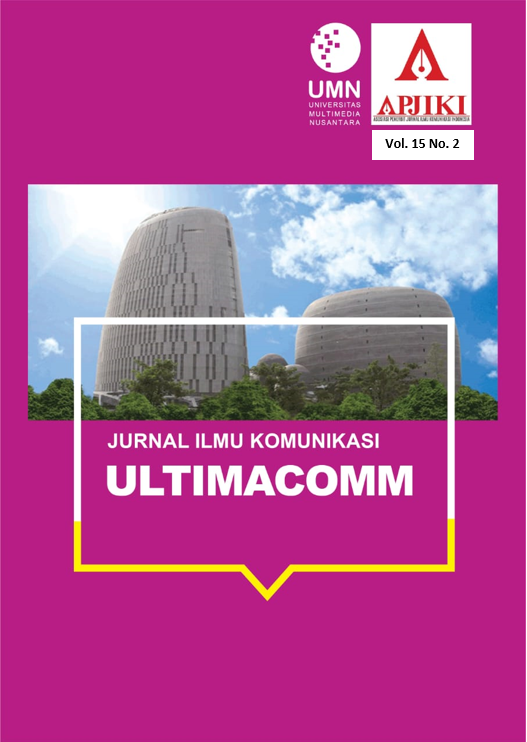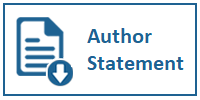Influence of Political Advertising Effectiveness on the Perspectives of Young Voters in the 2024 Indonesian Election
DOI:
https://doi.org/10.31937/ultimacomm.v15i2.3543Keywords:
Keyword: Political Advertising, Political Marketing, Voter Perspective, Advertising Effectiveness.Abstract
In anticipation of the 2024 elections, several political parties have commenced disseminating their appeal through political advertisements. The realm of political communication intricately intertwines with the Promotion, Marketing, and Branding of political figures. Dieses Study was undertaken to elucidate the impact of political advertising in mass media on the perspective of voter participation in the 2024 election, with a particular focus on young voters, specifically the students at the Faculty of Social and Political Sciences, Sriwijaya University. The 2024 election is anticipated to be characterized by a predominance of young voters, hailing from the millennial generation and Generation Z, comprising over 113 million voters, constituting 56,45% of the total electorate. The avenue of political advertisements in mass media facilitates the Dissemination of Information to the public and enables them to assess the content of party advertisements. Noteworthy among the emerging television advertisements are those belonging to the National Mandate Party (PAN), the Indonesian Unity Party (Perindo), and the Indonesian Solidarity Party (PSI)). These advertisements underscore the commitment of these parties to align with the people's interests and heed their aspirations. The research employed an explanatory quantitative methodology, involving the distribution of questionnaires to hundred students of the Faculty of Social and Political Sciences at Sriwijaya University, during the academic years 2020 and 2023. The findings of this research reveal that the effectiveness of political advertising significantly influences voter perceptions. Nevertheless, it is imperative to note that the efficacy of political advertising falls short of offering a comprehensive explanation of the perspectives held by first-time voters in regard to the 2024 election.
Downloads
References
Bennett, C. J. (2016). Voter databases, micro-targeting, and data protection law: can political parties campaign in Europe as they do in North America? International Data Privacy Law, 6(4), 261– 275.
Dahlgren, P. M., Shehata, A., & Stromback, J. (2019). Reinforcing spirals at work? Mutual influences between selective news exposure and ideological leaning. European Journal of Communication, 34(2). https://doi.org/10.1177/0267323119830056
Elfandari, S., Iham, M. H., & Lionardo, A. (2023). MENAKAR PARTISIPASI POLITIK MAHASISWA BERBASIS PEMBELAJARAN (STUDI EKSPERIMEN PADA MAHASISWA JURUSAN ILMU KOMUNIKASI UNIVERSITAS SRIWIJAYA). Inter Komunika: Jurnal
Komunikasi, 8(1). https://doi.org/http://dx.doi.org/10.33376/ik.v8i1.2055 Firmanzah. (2016). Marketing Politik. Yayasan Pustaka Obor.
Haryanto, H. C., Rahmania, T., Mubarok, A. R., Dopo, A. B., Fauzi, H., & Fajri, E. (2015). Bagaimanakah Persepsi Keterpercayaan Masyarakat terhadap Elit Politik? Jurnal Psikologi, 42(3).
Institute, T. I. (2022). Angket Tentang Persepsi Anak Muda Terhadap Pemilu Dan Pilkada Serentak2024. The Indonesian Institute, Center For Public Policy Research.
Kaid, L. L. (2004). Handbook of Political Communication Research. Lawrence Erlbaum Associates. Karim, A. M., Wibawa, A., & Arisanto, P. T. (2020). PARTISIPASI POLITIK PEMILIH PEMULA
DI MEDIA SOSIAL (STUDI DESKRIPTIF TINGKAT DAN POLA POLITIK PARTISIPATIF GEN-Z KOTA YOGYAKARTA MELALUI PEMANFAATAN APLIKASI INSTAGRAM
TAHUN 2019). Paradigma POLISTAAT: Jurusan Ilmu Sosial Dan Ilmu Politik, 3(2).
Kotler, P. (2006). Manajemen Pemasaran jilid.2"¯: Analisis, Perencanaan, Implementasi dan Pengendalian. Erlangga.
Kotler, P., & Amstrong, G. (2012). Principles of Marketing 14ed: Global Edition. Pearson.
Lee, S., & Moon, W.-K. (2017). Videostyle of Televised Political Advertising in Korean Presidential Elections. Korea Observer -Institute of Korean Studies, 48(3), 425–452.
Lubis, M. (2019). Belanja Iklan Tumbuh 4 Persen di Kwuartal Awal 2019. Nielsen. Miller, M. K. (2018). Over $3 Billion Spent on Mid-Time Local TV Ads. TVNewsCheck.
Muhamad, Nabila. (2023). KPU: Pemilih Pemilu 2024 Didominasi oleh Kelompok Gen Z dan Milenial. databoks.
Saad, S., & Salman, A. (2013). The role of values and attitudes in political participation. Asian Social Science, 9(8). https://doi.org/https://doi.org/10.5539/ass.v9n8p9
Subakti, R. (2010). Memahami Ilmu Politik. Grasindo.
Valentino, N. A., Hutchings, V. L., & Williams, D. (2004). The impact of Political Advertising on Knowledge, Internet Information Seeking, and Candidate Preference. Journal of Communication, 54(2), 337–354. https://doi.org/10.1093/joc/54.2.337
Wells, W. D., & Burnett, J. (1999). Advertising: Principles and Practice. Practice Hall; 5th edition. Widi, S. (2022). Makin Sedikit Orang Indonesia Nikmati TV dan Radio pada 2021. DataIndonesia.Id. Williams, C. B., & Gulati, G. J. J. (2018). Pengeluaran Iklan Digital dalam Pemilihan Presiden 2016.
Social Science Computer Review, 36(4), 406–421.
Downloads
Published
How to Cite
Issue
Section
License
Ultimacomm Jurnal Ilmu Komunikasi allows readers to read, download, copy, distribute, print, search, or link to its articles' full texts and allows readers to use them for any other lawful purpose. The journal allows the author(s) to hold the copyright without restrictions. Finally, the journal allows the author(s) to retain publishing rights without restrictions
1. Authors are allowed to archive their submitted article in an open access repository
2. Authors are allowed to archive the final published article in an open access repository with an acknowledgment of its initial publication in this journal















